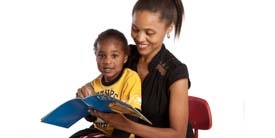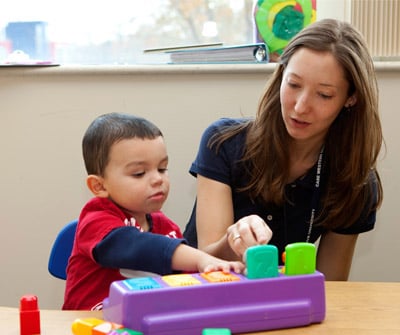Language is how a mother tells her baby "I love you" with a sing-song voice. It's how a 3-year-old tells a knock-knock joke while trying to hold back their laughter. It's how a teacher explains the rules of long division to her fidgety students. Language connects us, and language helps us learn.
At the most basic level, language is a set of symbols that a community has agreed upon to stand for objects and ideas. You use these symbols to talk listen, read, and write. In the case of American Sign Language, you use language to produce signs and interpret signs. Having effective language skills means that you can express your ideas and can understand when others express their ideas. Language is uniquely human, and babies begin to build the foundation for language even before they are born!
It can be helpful to think about the difference between language and speech. When your child says "I wuv my wed twuck," (I love my red truck), it doesn't sound right - that's the speech part - but she is sharing her thoughts on something she really likes - that's the language part.
Language includes which words you know and which words you chose to use. It is how you put those words together, the tone of voice that you use, and whether the person across from you understands what you mean. You use language to solve story problems in math class and write an essay in English class. Language skills are what allow you to build relationships with your family and friends.
Not having access to language is frustrating. Imagine being dropped in the middle of a foreign country with a pounding headache. You need to find a drug store, but how would you communicate what you need? How would you understand directions if someone did figure out what you were trying to say? You're in pain, you're confused, and you can't get your problem solved.
Now think of a two-and-a-half-year-old boy who doesn't yet say any words. His head is full of wants and needs, but he has no clear way of letting others know what they are. He also has trouble understanding what his parents want him to do when they give him simple directions. He often throws things when he can't be understood or doesn't understand what his parents want him to do. All of this is because he has difficulty with speaking and listening, that is, with language.
Language underpins everything we do, and having difficulty with language skills at any age means you can't fully participate in everyday life. Cleveland Hearing & Speech Center has a team of licensed speech-language pathologists (SLPs) with expertise in building language skills.
What is Language?
Tags: Speech, Language, Communication, literacy, Learning, Voice, toddler, talking, Early Intervention, Speech therapy
Build Preschool Language Skills While Reading to Your Child
Do you find yourself wondering how to make reading a book with your child more meaningful? Do you have a hard time trying to get your child to WANT to read a book? Here are eight fun and easy ways to engage your child when reading a book and increase their pre-literacy skills and language skills.
Tags: Speech, Communication, reading, literacy, Learning, toddler, Speech therapy
Build Better Reading Skills in Your Preschooler
Kick start your child’s pre-literacy and language skills by focusing on these areas while reading books with them. Children who develop these skills at an early age are more likely to become fluent readers and better spellers than children who do not. We define these skills as phonological awareness, which is the ability to recognize, manipulate, and use the sound structure of spoken language.
Tags: Speech, Language, Communication, reading, literacy, Learning, toddler, Early Intervention
Baby Sign Language Improves Communication
Infant sign language really does deliver on its promise of improved communication. This is particularly appealing for new parents, given that there’s a well-recognized gap between what babies and toddlers want to say and what they are able to say. Sign language can help ease frustration between ages 8 months and 2 years — when children begin to know what they want, need, and feel but don't always have the oral motor verbal skills to express themselves. Basic sign language can help babies better express themselves as early as 8 or 9 months and it can mean decreased frustration (for both caregiver and child), promote earlier language skills and enhanced bonding with those who sign.
Tags: Speech, Language, Communication, American Sign Language, ASL, Learning, toddler, talking, Early Intervention, Communication Access, Baby Sign Language
What is Dyslexia and How is It Treated?
Dyslexia is a specific learning disability that is neurological in origin. It is characterized by difficulties with accurate and/or fluent word recognition and by poor spelling and decoding abilities. These difficulties typically result from a deficit in the phonological component of language that is often unexpected in relation to other cognitive abilities and the provision of effective classroom instruction. Secondary consequences may include problems in reading comprehension and reduced reading experience that can impede growth of vocabulary and background knowledge.
Tags: Speech, Language, Communication, literacy, Wilson Reading Program, Learning, Dyslexia
“People Play” - Speech and Language Fun Time with Your Child
To get young children talking, we often motivate them by showing that “using your words” can get you what you want. A simple way to achieve this is through “People Play”. People Play describes “songs, games and activities in which the fun happens when the child interacts with another person” (The Hanen Program, More Than Words). So grab a blanket or a couch cushion and enjoy some of these great ways to play and interact that will also motivate your child to request more fun! The one-word language suggestions can always be lengthened into phrases or sentences depending on your child’s expressive language level.
Tags: Speech, Language, Communication, Learning, toddler, talking
More Talking Please! 7 Fun Activities to Promote Speech & Language in the Young Child
Everyday activities can be opportunities to expand learning – particularly for speech and language. Here are seven easy, familiar options you can do at home with your child that offer speech and language cues. Encourage the child to repeat words or anticipate the next word or sentence. For example, after we put on our socks, what comes next? Shoes.
Tags: Speech, Language, Communication, Learning, toddler, talking
What is Selective Mutism and How is it Treated?
Selective mutism is a complex childhood anxiety disorder characterized by a child’s lack of verbal communication in select social environments, such as school. Children with selective mutism possess the ability to speak, but are selective of the settings in which they choose to speak. They will often speak in environments where they feel safe, relaxed, and calm with familiar people such as parents or siblings, but will choose not to speak in environments where they are less comfortable. A common misconception is that selective mutism is a form of autism. Children with selective mutism may demonstrate lack of appropriate social language use that mimics those on the autism spectrum, but selective mutism is not indicative of autism.
Tags: Speech, Language, Communication, Stuttering, Learning, Voice, talking
How Can I Help My Child Become a Good Reader?
Learning to read can be challenging for children. Fortunately, research is now available that suggests how to give each child a good start in reading. When parents help their children learn to read, they help open the door to a new world.
5 Toys = 5 Ways to Improve Speech Development
Playing with your child is a essential way to improve his/her speech, language, and social skills! Below are five different toys and ways to play with your child to encourage language growth and development:
Mr./Mrs. Potato Head:
- Following Directions: Ask your child to give you various parts. If this is too simple, ask him/her in a more complex way. For example, instead of asking for Mr./Mrs. Potato Head's shoes, say "the ones you put on your feet.” Sometimes this works best after the child has built Mr./Mrs. Potato Head and is asked to follow the directions of placing each part back into the box.
Tags: Speech, Language, Communication, Support, Learning, Voice, toddler, talking


















